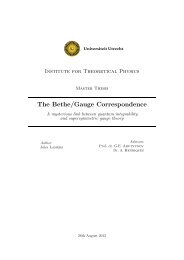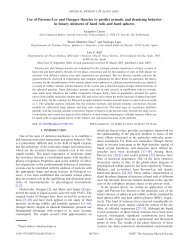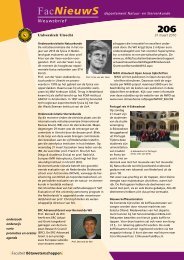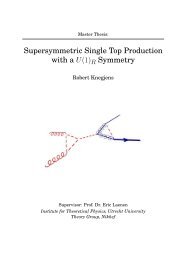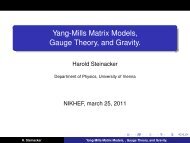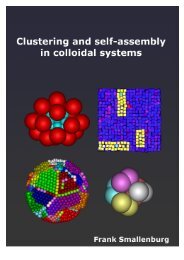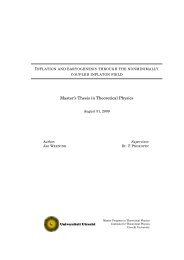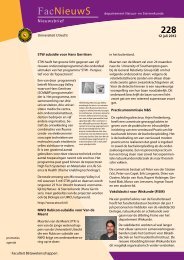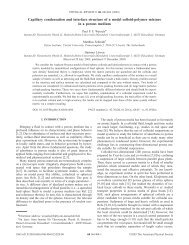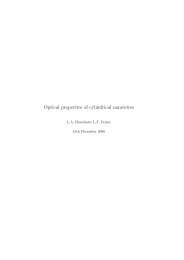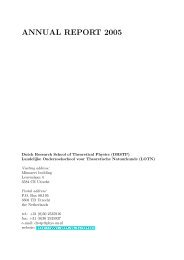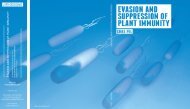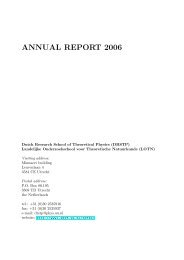Plant basal resistance - Universiteit Utrecht
Plant basal resistance - Universiteit Utrecht
Plant basal resistance - Universiteit Utrecht
You also want an ePaper? Increase the reach of your titles
YUMPU automatically turns print PDFs into web optimized ePapers that Google loves.
Chapter 5<br />
et al., 2009), and alleles contributing to the genetic variation in the biosynthesis of these<br />
secondary metabolites are of little relevance for non-brassicaceous crops, such as cereals.<br />
Moreover, Arabidopsis is a pioneering plant species that was originally selected by plant<br />
geneticists for its short generation time, which by itself can be regarded as an adaptive<br />
strategy to cope with environmental stress, but is not necessarily a desirable trait in crops.<br />
As an alternative strategy, genetic variation in defence traits amongst ancestral<br />
plants of crops can be explored as a means to introduce new combinations of alleles into<br />
modern crop plants. An extensively researched example comes from the development<br />
of breeding programmes that aim to introgress traits from ancestral wheat varieties into<br />
modern elite varieties, where limited genetic diversity in defence traits is exhibited as a<br />
result of repeated selection for high yield (Skovmand et al., 2001; Trethowan and Mujeeb-<br />
Kazi, 2008). Alarmingly, many wild wheat ancestors and landraces are at risk of disappearing,<br />
due to displacement from their natural habitats by agronomically superior cultivars and over<br />
grazing by livestock. To combat this loss of valuable diversity, extensive collections of rare<br />
species are now being assembled for exploitation in wheat breeding programs (Skovmand,<br />
2002). These programmes have enabled a number of race-specific R genes to be introduced<br />
into hexaploid wheat species. However, as discussed, R genes do not always provide durable<br />
disease protection, since the resulting ETI can be broken by pathogen evolution (Jones and<br />
Dangl, 2006). A notable exception has been the identification of the WKS1 gene, which<br />
confers partial and temperature-dependent <strong>resistance</strong> in mature wheat against multiple<br />
races of the stripe rust, Puccinia striiformis (Fu et al., 2009). The WKS1 gene is absent in<br />
commercial wheat varieties and was introgressed from the ancestral wheat accession T.<br />
turgidum L. ssp. Dicoccoides (Uauy et al., 2005). Interestingly, WKS1-dependent <strong>resistance</strong><br />
manifests as a rapid formation of auto-fluorescent cells around the sides of P. striiformis<br />
infection (Fu et al., 2009), indicating that WKS1 provides primed responsiveness to pathogen<br />
attack. WKS1 encodes a protein kinase with a putative START domain. This class of proteins<br />
have been reported to play a role in lipid binding and sensing (Alpy and Tomasetto, 2005),<br />
suggesting that WKS1 is involved in the transduction of pathogen- or plant-derived lipid<br />
signals. Interestingly, lipid signals have also been implicated as critical signals in SAR-related<br />
defence priming. Although the exact signalling function of WKS1 remains to be investigated,<br />
the study by (Fu et al., 2009) clearly illustrates how genetic variation in <strong>basal</strong> <strong>resistance</strong><br />
within an ancestral plant species can be exploited to provide durable disease protection in a<br />
commercially important crop.<br />
Apart from breeding strategies to introgress <strong>basal</strong> <strong>resistance</strong> genes from ancestral<br />
crop species, biotechnological strategies can be considered as well. As was recently outlined<br />
by Gust et al. (2010), a promising strategy to improve crop <strong>resistance</strong> would be to transfer<br />
PRRs from naturally occurring plant species into crops. This transgenic approach would<br />
boost PTI responsiveness, provided that the heterologously expressed PRRs connect onto<br />
114



